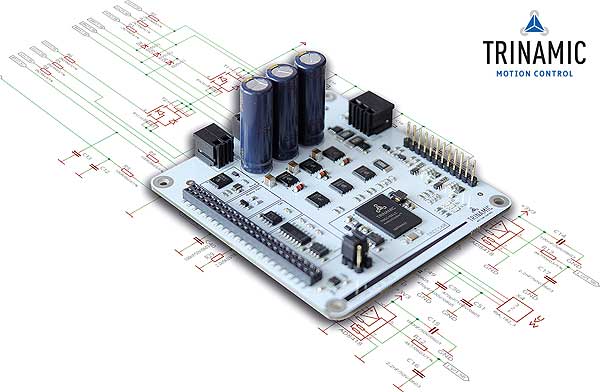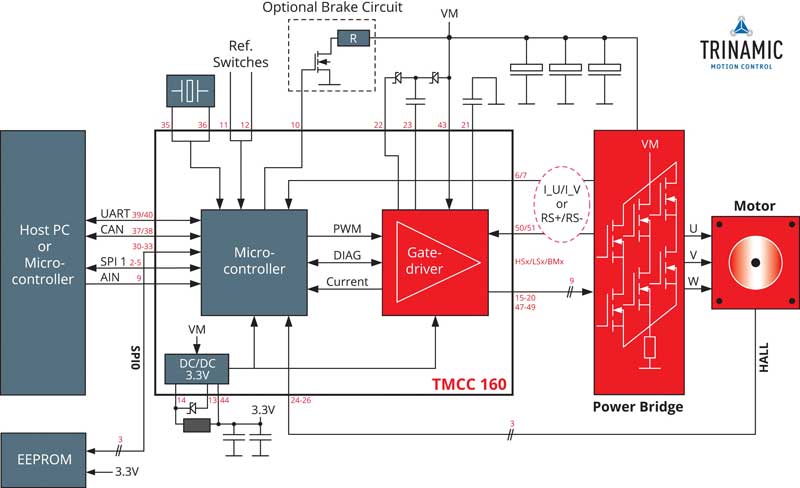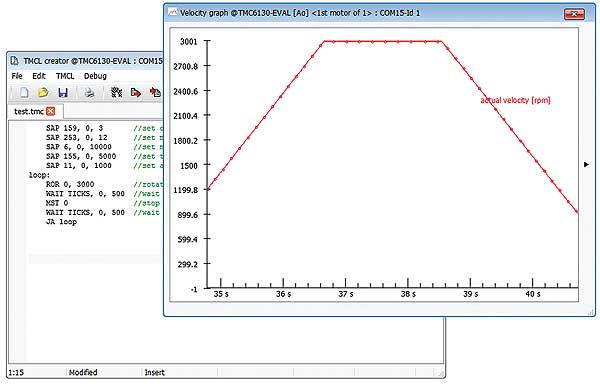Typically, however, the core skills required of manufacturers of equipment and systems who integrate electric drives into their products lie on a much higher abstraction plane. Someone who is developing blood analyzers, for example, has outstandingly good skills in the fields of image processing or reagents, while the movement of probes and sensors is simply a necessary evil. Either the drive technology is bought in as a ready-to-use module, or the skills required are worked up in-house, which tends to detract from the focus on the core task.
This means that drives must be capable of integration in the simplest possible manner, in the form of hardware and software building blocks which come ready to use, in whatever products may be involved, without a detailed know-how of motor actuation and control being a prerequisite for the product developer.
The newly presented TMCC Motion Cookie series from Trinamic addresses precisely this requirement. This is a microsystem with integrated driver hardware, application software and protocol stacks, which means that design and development cycles can be shortened to a bare minimum.
In addition to the integrated application processor, on which the field-oriented regulating unit, a ramp controller, and the protocol stacks are executed, the TMCC160 also features a high performance gate driver with a gate flow of maximum ±1A, which means that it can reliably and rapidly control N-channel power switches for 3-phase control systems, with a power rating from a few tens of Watts to 1kW at 24V supply voltage. In order to reduce the total number of components required, an integrated switching controller provides the voltage to the module and other digital components in the system.
 For rapid design-in, the TMCC160-EVAL is available as a validated reference design.
For rapid design-in, the TMCC160-EVAL is available as a validated reference design.
The reference design is divided into individual easily adaptable design blocks. Available as a basic block is the TMCC160 motionCookie, together with a perfect example of an output stage and the circuitry required for this, for current measurement for a motor power of up to 500W.
Circuitry units for bus communication via RS232, RS485, or CAN, as well as for analog and digital control signals are available as delimited building blocks which can easily be adopted into the developer’s own design.
One of the key development aims was to reduce development times and costs for embedded servocontrollers to the minimum necessary, and for that purpose a field-oriented control unit is implemented onto the motionCookie microsystems, together with the superordinate speed and position controllers.
With the TMCL-IDE, available at CODICO, developers now have a powerful tool at their fingertips for quick implementation and parameter setting of the control system.
As a supplement to the TMCL protocol, later members of the motionCookie family will also be on offer with industry standard protocol stacks such as CANopen or CANopen over EtherCAT (CoE).
If you are interested in Trinamic’s products, please contact the following persons:
Ivan Mitic – Tel: +43 1 86305 194
e-mail: ivan.mitic@codico.com
Johannes Kornfehl – Tel: +43 1 86305 149
e-mail: johannes.kornfehl@codico.com
CODICO | www.codico.com | https://www.codico.com/shop/en/highlights.html




